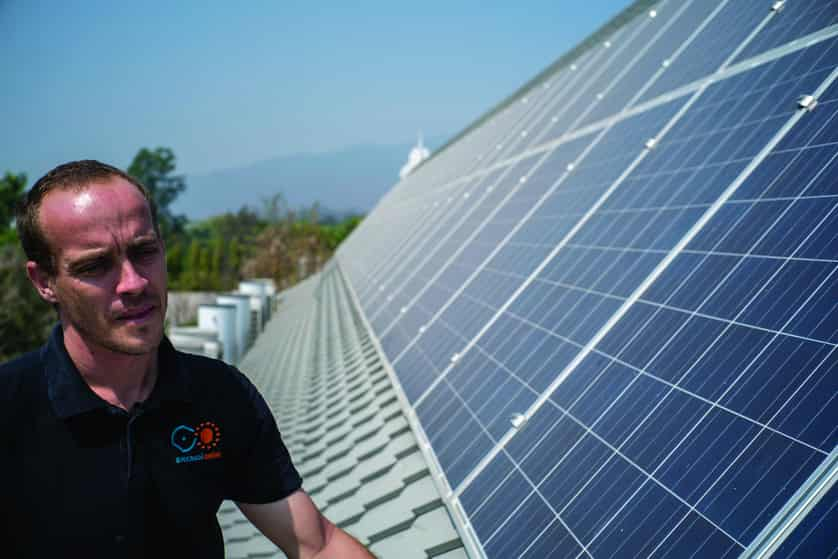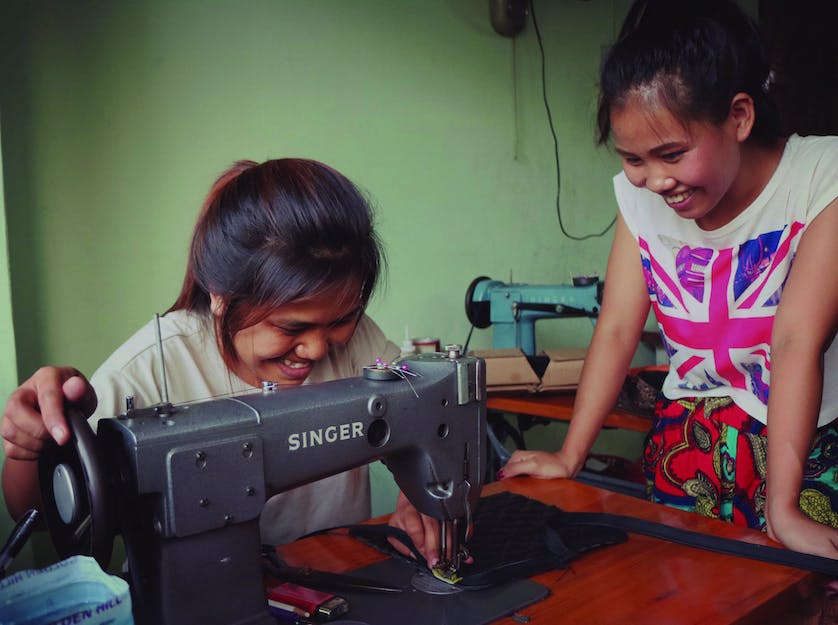The word ‘sustainability’ is thrown around with such abandon these days that it’s hard to actually pin it down. According to the United States Environmental Protection Agency, sustainability describes the principle whereby everything we need for our survival and well-being depends, either directly or indirectly, on our natural environment.
The time is ripe in Chiang Mai — given its noticeable waste problem and worsening pollution crisis — for a burgeoning sustainability movement. Although perhaps not fully fledged, we are seeing a great rise in not just awareness, but also green businesses across Chiang Mai. In a country where systems for everyday sustainability are often lacking — it is clear that the concept is not only achievable, but also turning out to be a highly rewarding business concept. Here are a few examples of these green brands and the innovative individuals behind them.

SuperBee
Nestled in the mountains of Chiang Mai is a serene workshop, where Antoinette Jackson and her team of ‘bees’ operate a business and social enterprise manufacturing wax wraps — a reusable and very pretty alternative to conventional plastic kitchen wrap for preserving food items. Jackson, a native of Australia, first thought up the idea for a wax wrap business while having a conversation with her father about the issue of plastic waste. Inspired to reduce plastic usage, Jackson began manufacturing her own beeswax wraps in her kitchen at home in 2016.
Although the concept is not unique (there are many companies doing the same in the West already), the SuperBee mission also makes a considerable effort to support the local community, employing a staff of 12 local villagers and paying them generously, at twenty percent over the fair wage guide.
Employees at SuperBee carry out the multi-step process of creating the wax wraps, beginning with the cutting of fabric and ending with a careful quality-check of each individual wrap before it is sent out into the market. The wraps are made from a combination of cotton cloth, tree resin, coconut oil and, of course, beeswax. The beeswax used is sustainably harvested, OTOP certified, and purchased from a local distributor. In addition, nearly all of the equipment in the small factory is handmade by local artisans, in keeping with the company’s ‘local-first’ attitude.
SuperBee has a range of sizes and products available such as ‘Beeginner’ sets, with several wraps of differing sizes and larger sets of one size wraps. The company is also beginning to sell a DIY Wax Wrap kit online in the company’s Etsy shop, for those who want to try their hand at making their own beeswax wraps at home.
In Chiang Mai, SuperBee distributes to a number of cafes and wholefood shops including Aden’s Shop (JJ Market), Free Bird Cafe, Blue Diamond Cafe, My Secret Cafe, Urban Green Organic, Good Heath and Healthy B among many others.
Jackson explains that she founded the company in her quest for work that was more meaningful. SuperBee plans to open a storefront of their own in Kad Farang, where SuperBee products, as well as other handcrafted and locally-manufactured goods, can be purchased.
superbee.me
etsy.com/shop/SuperbeeWaxWraps
Facebook: Superbeewaxwraps

Eyekandi Solar Co.
If you thought solar was way out of the price range for the average person, think again. Eyekandi Solar is slowly, but surely, paving the way for accessible solar energy in Thailand. Located in Hang Dong, this group of businesspeople, engineers and innovators are working hard to bring a sustainable business model to the otherwise rather pricey solar panels we find here in Thailand. Being direct importers from China, they are able to offer solar panels to their local clients at competitive rates. Christian Barmen, CEO of Eyekandi, sat down with Citylife and shared with us the company’s story and sustainable philosophy.
Barmen, originally from Norway, began Eyekandi in 2009 as a manufacturing company. The business brought him to China and then eventually to Thailand, his wife’s home country. In 2016, Barmen met Sean Abbott, a Californian native and a specialist in installation, through a shared passion of skateboarding, and together they came up with Eyekandi Solar. Their goal was to reduce energy consumption and promote power security in Thailand.
While Eyekandi is a large-scale manufacturer, they also offer affordable panels to the Thai market. Barmen also believes strongly that the physical and mental wellbeing of employees are factors just as important to a company’s success as smart business practices. As such, he encourages the practice of ‘biohacking’ within the everyday functioning of the company. Biohacking, Barmen explains, “is all about influencing your biology, through practices like meditation, healthy diet, and training. We want our employees to be strong and happy.”
Barmen believes that there’s more to sustainable business than just environmental conscientiousness. To be truly sustainable, he says, businesses must also consider the health and happiness of the individuals behind it. In accordance with its philosophy, Eyekandi’s headquarters are powered completely by solar energy. The employees have standing desks, they grow their own organic vegetables, cook their own food and their kitchen is filled with immunity-building foods and supplements and there are even skate ramps where Barmen and Abbott can get down to what they love best.

Tube Thailand
The folks at Tube Thailand are playing their own part in the push for sustainability. As a subset of the Raintree Foundation, which runs several social projects to benefit developing communities in Thailand, among Raintree’s projects are educational programmes, foster care, children’s homes, eyeglasses projects, basic job training, coffee production, and clean drinking-water projects. Tube Thailand was started in 2014 as a means of providing employment and fair wages to hill tribe women in addition to utilising excess rubber waste in Thailand. Tube Thailand manufactures fashion products like bags and backpacks, using recycled inner tubes from motorbikes and bicycles, and even old seatbelts.
Maddi Winterling, the sales and marketing manager at Tube Thailand, designs the products for the company’s line. Maddi says her designs came out of a desire for sustainable fashion that was unique and fashion-forward. Tube Thailand introduces eco-friendly fashion that is chic and modern, yet inexpensive and suitable for the environmentally-conscious buyer.
Hand-sewn by a small group of Lahu women, each bag is manufactured with care and quality. Every purchase from Tube Thailand not only helps reduce the amount of rubber waste going to landfill, but also enables these hard-working women to earn fair wages in order to support themselves and their families. Tube Thailand follows Fair Trade standards and business principles. Among the products sold by Tube Thailand are wallets, laptop bags, messenger bags, shoulder bags, cosmetic bags, bum bags, and their biggest seller this year, seatbelt backpacks.
tubethailand.com
raintree-foundation.org
Sustainability Doesn’t Stop There
Among other green businesses in Chiang Mai, there are a few that are leading the way in the sustainable movement, such as Free Bird Cafe, Boo Boo Bamboo Straw, and Sop Moei Arts.
Free Bird Cafe was set up Lisa Nesser of Thai Freedom House, 2016’s beneficiary of the Citylife Garden Fair, and acts as both a cafe and a language and arts learning centre that provides educational and additional resources to Burmese refugees and minority groups in Thailand. All of the profits from Free Bird Cafe, a 100% social-enterprise vegan restaurant, go to the support of these groups. Free Bird Cafe uses local, organic ingredients and is committed to recycling and producing minimal waste. Free Bird Cafe also sells sustainable products such as reusable shopping bags, wooden utensils, and bamboo straws and toothbrushes.
Facebook: Free Bird Cafe

Boo Boo Bamboo Straw was also born as a result of the efforts behind Thai Freedom House. Encouraged by the organisation’s founder, Lisa Nesser, to come up with a sustainable business concept, Jing Lung Kham, one of the chefs employed by Free Bird Cafe, thought up the idea for Boo Boo Bamboo Straw. The straws, handmade by Burmese refugees from Jing’s village, are made from bamboo that is wild-sourced and naturally anti-microbial. Sales of the straws provide income for these refugees while at the same time contribute to necessary plastic reduction. The straws are named after Jing’s son, Boo Boo. Boo Boo straws can be purchased both online via their Facebook page and in Free Bird Cafe.
Facebook: Boo Boo Bamboo Straw
Sop Moei Arts is a non-profit organisation that facilitates the sales of textiles and baskets made by members of the Pwo Karen tribe. Among the products sold by Sop Moei Arts are tapestries, baskets, cushions, scarves, bags, and backpacks. All items sold by Sop Moei arts are handmade and high-quality, featuring both modern and traditional designs. The organisation allows the Pwo Karen people, who struggle with poverty, to utilise their skills in order to generate a reliable income for themselves. Sop Moei products can be purchased online or in one of the organisation’s two storefronts, in Chiang Mai and Bangkok.
150/10 Chareonrajd Road
sopmoeiarts.com

